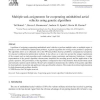Free Online Productivity Tools
i2Speak
i2Symbol
i2OCR
iTex2Img
iWeb2Print
iWeb2Shot
i2Type
iPdf2Split
iPdf2Merge
i2Bopomofo
i2Arabic
i2Style
i2Image
i2PDF
iLatex2Rtf
Sci2ools
COR
2006
2006
Multiple task assignments for cooperating uninhabited aerial vehicles using genetic algorithms
A problem of assigning cooperating uninhabited aerial vehicles to perform multiple tasks on multiple targets is posed as a new combinatorial optimization problem. A genetic algorithm for solving such a problem is proposed. The algorithm allows us to efficiently solve this NP-hard problem that has prohibitive computational complexity for classical combinatorial optimization methods. It also allows us to take into account the unique requirements of the scenario such as task precedence and coordination, timing constraints, and trajectory limitations. A matrix representation of the genetic algorithm chromosomes simplifies the encoding process and the application of the genetic operators. The performance of the algorithm is compared to that of deterministic branch and bound search and stochastic random search methods. Monte Carlo simulations demonstrate the viability of the genetic algorithm by showing that it consistently and quickly provides good feasible solutions.This makes the real ti...
| Added | 11 Dec 2010 |
| Updated | 11 Dec 2010 |
| Type | Journal |
| Year | 2006 |
| Where | COR |
| Authors | Tal Shima, Steven J. Rasmussen, Andrew G. Sparks, Kevin M. Passino |
Comments (0)

